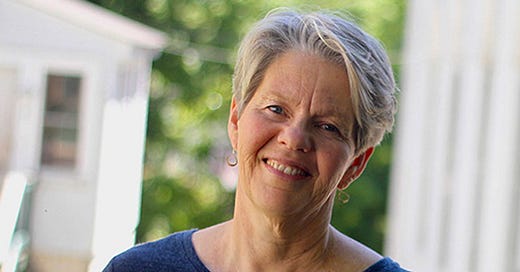Hello! Welcome to another episode of Inside The Newsroom where today we welcome Betsy Sweet to the podcast! Betsy’s a veteran of Maine politics and is running for U.S. Senate, where she must defeat Sara Gideon and Bre Kidman in July’s Democratic primary, before taking on Republican incumbent Susan Collins. Our conversation centered around the ridiculous nature of U.S. elections that sees voters bombarded with political ads and door knocking for two years, before it all starts again for the next cycle. And we went deep into campaign finance laws and the history behind Citizens United, which allows corporations to fund candidates in the name of free speech. Up top is the podcast, down below is the post-game, but first my top stories of the week. Enjoy! ✊
Picks of the Week
Elon Musk — He’s back! The billionaire tech mogul appeared on Joe Rogan’s podcast for the second time, a year after smoking a blunt live on air
Fossil Fuel Bailout — Oil prices have tanked to their lowest in 15 years, but instead of keeping to their capitalist principles, oil firms are seeking a bailout
Bibi Netanyahu — Israel’s Prime Minister is on the verge of forming a unity government delaying the country’s fourth general election in a year
❤️❤️❤️How You Like Me Now? ❤️❤️❤️
Before you read on, please like this edition of Inside The Newsroom by clicking the ❤️ up top. That way I’ll appear in clever algorithms and more people will be able to read.
Job Corner
More than 350 active journalism jobs, internships and freelance gigs are currently listed, with no position posted before March 1. Companies include CNN, the BBC, the NBA and Telemundo. Spread the word far and wide!
Who is Betsy Sweet?
There’s a saying that in order to know what a person is about, look at what they’ve done. Betsy’s been helping others for almost 40 years, whether it was writing and helping to pass the first Family Medical Leave Act in the country, getting rid of environmental toxins from building materials and children’s toys, or expanding the Human Rights Act in Maine, Betsy’s record speaks for itself. If and when Betsy wins June’s Democratic primary, she must topple Republican incumbent Susan Collins, who’s been a U.S. Senator from Maine since 1997. One of the most vulnerable Republicans in the country, Collins is against Medicare For All and the Green New Deal, and has voted with Donald Trump 67 percent of the time since he assumed office. Betsy 👇

A Brief History of Maine Politics
As is often the case with many states, there’s a disconnect between Maine’s presidential and U.S. Senate voting history. Apart from Maine’s 2nd congressional district giving Donald Trump a single collegiate vote in 2016, the Pine Tree State has voted blue solidly since George H. W. Bush swept the country in 1988. Meanwhile, Betsy’s vying to become the first Democratic senator to represent the state since George J. Mitchell did so in 1995 — current senator Angus King has a mixed history but was elected as an independent in 2012.
Credit: 270toWin

This is a massive part of U.S. politics that’s all too often glossed over, with most outlets labelling Maine a blue state, or West Virginia, for example, a red state, when in reality neither is any color other than purple. That’s why Betsy is running on a platform of issues that shouldn’t be seen as left or right, but rather up and down, supporting the average voter against big-money interests of corporations and billionaires.
Where Do Campaign Contributions Go Once a Campaign Ends?
It’s a question I’ve always wondered, especially on the presidential level where campaigns can be left with millions of dollars after they’re suspended. The 2020 Democratic primary field raised an estimated $2 billion million between the two dozen or so candidates, including the $1 billion Michael Bloomberg and $315 million Tom Steyer dropped on their campaigns.
There are many paths candidates take. If you’re Elizabeth Warren, you might use the $11 million in hand to pay the $5.9 million monthly payment it cost to run your campaign. If you’re Beto O’Rourke, you might make donations to organizations including Everytown For Gun Safety and March For Our Lives, which champion gun control and is something Beto holds close to his heart after the El Paso mass shooting that left 20 dead last year. If you’re Mini Mike Bloomberg, you might transfer a cool $18 million to the DNC, making it the largest transfer by a presidential campaign in recent history. If you’re one of the many senators or representatives, you might transfer funds from your presidential campaign to your congressional campaign, so long as they don’t surpass limits on what donors had already contributed.
Which raises the next question: How much does all the ad spending benefit local economies?
Ad Spend in the Local Economy
We know that more than $2 billion was raised by Democratic candidates in the 2020 primary race and the majority of that will have been spent in advertising. This means that early voting states such as Iowa, New Hampshire, Nevada and South Carolina felt a real cash injection from not only the increased advertising, but also from campaigns and reporters spending money on hotels, in restaurants and on rental cars for example. Research conducted by Rebecca Lessum, an assistant professor of economics at Carnegie Mellon University, and Carly Urban, an associate professor of economics at Montana State University, found that increased spending in a state around a primary can increase total per capita earnings in that quarter by up to 25 percent.
If you follow elections in other countries, you’ll know that the U.S. system is an anomaly in that there’s barely a break in political campaigning. As soon as the current presidential cycle ends in November, it’ll be a few short months before activity resumes toward the 2022 midterms, if not right away. Compare that to the UK’s campaigning rules, which states that the official campaign period is limited to 25 working days. It’s why Betsy is among a growing number of people calling for limits to the campaign period in the U.S., so not to desensitize voters from the onslaught of campaign material.
Citizens United Inc
Perhaps the main reason why U.S. presidential campaigns are so damn long is the money involved. Betsy and I discussed the need to reduce the influence money has on politicians and their policies, which in turn fuels the endless campaigning. That’s where Citizens United enters the fray, which was a landmark case in 2010 that ruled that political spending is a form of free speech protected under the First Amendment, and opened the door for corporations to spend unlimited amounts of money on political advertising. While the increased spending will inevitably benefit local economies, it reduces the power of each voter and allows lobbyists to buy candidates and elections.
But it wasn’t always like this and doesn’t have to be this way. Between 1907 and 1970, a series of acts were passed limiting the influence of money in politics. And in 1971, Congress passed the Federal Election Campaign Act, which strengthened the requirement for candidates to publicly report their campaign finance and put limits on the amount they could receive in one go. But then in 2010, Citizens United paved the way for the open season system the U.S. has today. A full history can be found in the below video…
Last week…
#75 — Alex Schiffer (The Athletic) on the grind of making the jump from local to national journalism
#74 — Major Garrett (CBS News) on the difference between asking Barack Obama and Donald Trump questions in the White House press briefing room
… Next week
#77 — Francesco Marconi on the future of artificial intelligence and machine learning in journalism
#78 — Mark Gamaba (U.S. House Candidate OR) on his 30-year career in photo journalism and now running for national office
Related podcasts…
#73 — Nick Rubando (U.S. House Candidate OH) on winning the Democratic nomination for Ohio’s 5th district and November’s general election
#68 — Mckayla Wilkes (U.S. House Candidate MD) on America’s draconian At-Will employment laws, and the need for Universal Basic Income
#64 — Paula Jean Swearingen (U.S. Senate Candidate WV) on West Virginia’s toxic history with coal mining, and the impact of Alexandria Ocasio-Cortez
Thanks for making it all the way to the bottom. Please like and share this edition of Inside The Newsroom by clicking the ❤️ below. That way I’ll appear in clever algorithms and more people will be able to read.
If you haven’t already, please consider subscribing to get a newsletter about a cool news topic in your inbox every time I publish (1-2 times a week). You can find me on Twitter at @DanielLevitt32 and email me corrections/feedback or even a guest you’d like me to get on the podcast at daniellevitt32@gmail.com.














Share this post